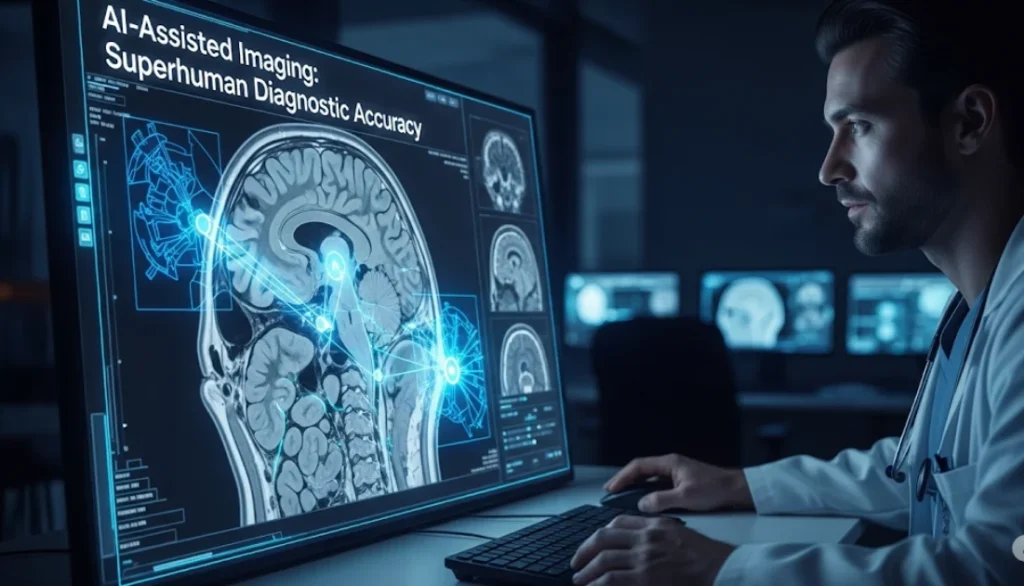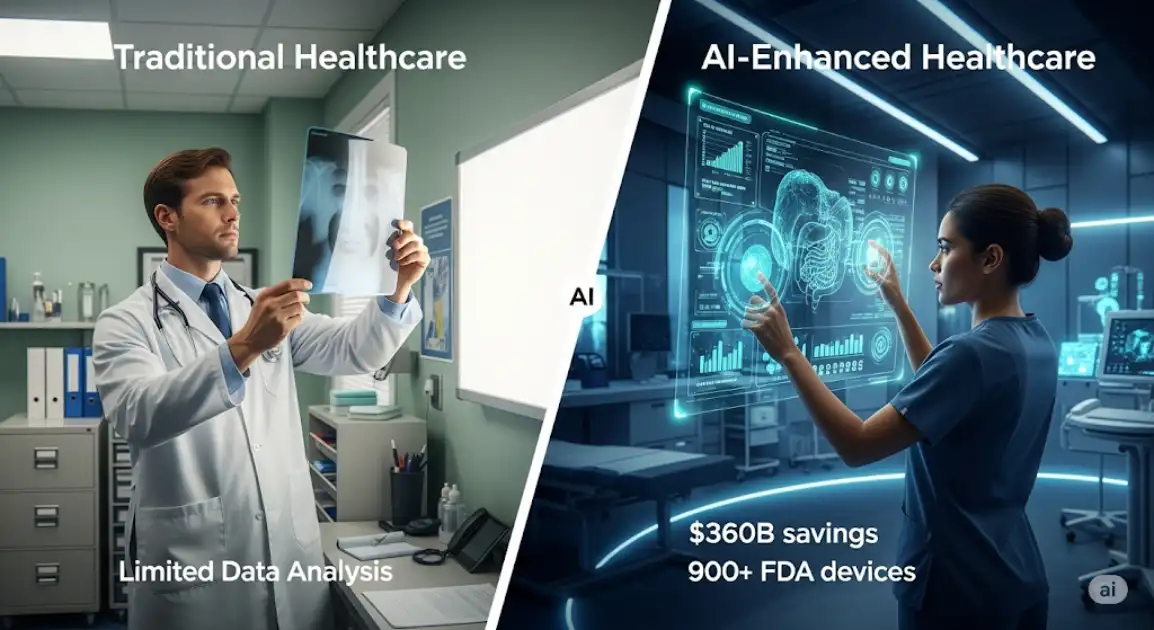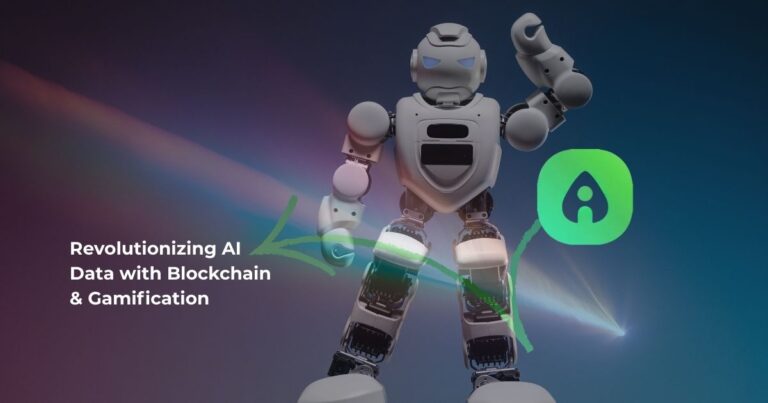AI Transforms Healthcare: From $360B in Savings to FDA-Approved Diagnostics
The healthcare industry stands at the precipice of its most significant transformation since the introduction of antibiotics. Artificial intelligence is not just changing how we practice medicine, it’s fundamentally reshaping every aspect of healthcare delivery, from initial diagnosis to treatment outcomes and administrative operations.
The numbers tell a compelling story: 691 FDA-approved artificial intelligence and machine learning (AI/ML)-enabled medical devices are currently authorized, with 900 new approvals in just the first half of 2025. This represents explosive growth from just six AI devices approved in 2015 to what experts project will be over 1500 by the end of 2025.
But perhaps more striking is the economic impact. McKinsey and Harvard researchers estimate that AI-enabled cost savings could reach $360 billion annually within the next five years – equivalent to nearly $1 billion in healthcare savings every single day. This isn’t just incremental improvement; it’s a complete reimagining of how healthcare operates.
The FDA Approval Explosion: A New Era of Medical AI
The regulatory landscape has transformed dramatically as the FDA has streamlined approval processes for AI-enabled medical devices while maintaining rigorous safety standards.
Unprecedented Growth in Medical AI Approvals
By August 20, 2025, 1200 AI-enabled medical devices were listed on the FDA website, representing a nearly exponential growth curve that shows no signs of slowing. This surge reflects not just technological advancement, but genuine clinical need and proven patient benefit.
Key approval statistics:
- 2015: 6 FDA-approved AI medical devices
- 2023: 221 new approvals in a single year
- 2024: 950 devices approved.
- 2025: 148 devices approved and still more to go
- Total approved: Over 1325 devices and counting
Leading Medical Specialties Embracing AI
The distribution of AI approvals reveals where the technology is making the most immediate impact:
Top specialties by AI device approvals:
- Radiology – 65% of all AI medical devices (imaging analysis, diagnostic assistance)
- Cardiology – 12% (ECG interpretation, cardiac imaging, risk prediction)
- Ophthalmology – 8% (diabetic retinopathy screening, glaucoma detection)
- Pathology – 6% (tissue analysis, cancer detection)
- Anesthesiology – 4% (patient monitoring, dosage optimization)
- Other specialties – 5% (dermatology, neurology, psychiatry)
This concentration in radiology makes sense – imaging generates massive amounts of data that AI can process with superhuman speed and often superior accuracy to human radiologists for specific conditions.
Revolutionary Applications Transforming Patient Care
AI-Assisted Imaging: Superhuman Diagnostic Accuracy
Modern AI imaging systems can detect diseases earlier and more accurately than traditional methods, fundamentally changing patient outcomes.

Breakthrough diagnostic capabilities:
- Cancer detection: AI systems now identify lung cancer in CT scans with 94.4% accuracy, compared to 65% for human radiologists
- Diabetic retinopathy: AI screening can prevent blindness by detecting early-stage disease in routine eye exams
- Cardiac analysis: AI can predict heart attacks up to 5 years in advance by analyzing routine cardiac imaging
- Stroke detection: AI reduces diagnosis time from hours to minutes, critical for treatment effectiveness
Real-world impact example: Google’s AI system for diabetic retinopathy screening has been deployed in over 150 clinics across India, Thailand, and other countries, providing specialist-level diagnosis in areas with limited access to ophthalmologists.
Administrative Revolution: 25% of Healthcare Work Could Be Automated
Goldman Sachs research reveals that more than 25% of work performed by healthcare professionals could be automated through AI, primarily in administrative tasks that currently consume enormous amounts of time and resources.
High-impact automation opportunities:
- Patient scheduling and coordination – AI can optimize appointment scheduling, reducing wait times by up to 40%
- Medical record documentation – Natural language processing can generate clinical notes automatically
- Insurance authorization – AI can process prior authorizations in minutes rather than days
- Billing and coding – Automated coding reduces errors and speeds claim processing
- Drug interaction checking – Real-time analysis of medication combinations prevents dangerous interactions
Case study: The Chelsea and Westminster NHS Trust is piloting an AI system that automatically generates patient discharge summaries, reducing documentation time by 75% while improving accuracy and consistency.
Drug Discovery Acceleration: From Decades to Years
Pharmaceutical development traditionally takes 10-15 years and costs over $1 billion per approved drug. AI is compressing these timelines dramatically.
AI-driven drug discovery breakthroughs:
- Molecule identification: AI can screen millions of potential compounds in days rather than months
- Clinical trial optimization: AI helps identify ideal patient populations and predict trial outcomes
- Drug repurposing: AI discovers new applications for existing drugs, dramatically reducing development time
- Protein folding prediction: AI systems like AlphaFold have solved protein structures that took decades to understand
Success stories:
- Atomwise used AI to identify potential treatments for Ebola in just days
- BenevolentAI discovered existing drugs that could treat ALS, reducing research time from years to months
- Recursion Pharmaceuticals has over 40 programs in development using AI-driven drug discovery
Personalized Medicine: Treatment Tailored to Individual Patients
AI enables unprecedented personalization of medical treatment based on individual patient data, genetic profiles, and real-time health monitoring.
Personalized medicine applications:
- Genomic analysis: AI interprets genetic data to predict disease risk and treatment responses
- Treatment optimization: AI adjusts medication dosages based on patient response patterns
- Risk stratification: AI identifies high-risk patients for preventive interventions
- Lifestyle recommendations: AI provides personalized diet, exercise, and lifestyle guidance
Example: IBM Watson for Oncology analyzes patient data against vast medical literature to recommend personalized cancer treatment plans, though adoption has been mixed due to training data limitations.
The $360 Billion Economic Impact: Breaking Down the Savings
The projected $360 billion in annual healthcare savings represents multiple efficiency gains across the entire healthcare system.
Administrative Cost Reduction: $200 Billion Opportunity
Healthcare administration consumes an estimated 30% of total healthcare spending in the US – far higher than other developed countries. AI can dramatically reduce these costs.
Administrative savings breakdown:
- Claims processing automation: $50 billion annually
- Prior authorization streamlining: $40 billion annually
- Medical record management: $35 billion annually
- Appointment scheduling optimization: $25 billion annually
- Billing and coding automation: $30 billion annually
- Regulatory compliance: $20 billion annually
Clinical Efficiency Improvements: $100 Billion Impact
AI-assisted clinical decision-making and workflow optimization create substantial cost savings while improving patient outcomes.
Clinical efficiency gains:
- Diagnostic accuracy improvement: Reduces misdiagnosis costs by $40 billion annually
- Treatment optimization: Prevents unnecessary procedures worth $35 billion annually
- Hospital readmission reduction: AI-predicted interventions save $25 billion annually
Drug Development and Discovery: $60 Billion Acceleration
Faster, more efficient drug development reduces costs that are ultimately passed on to patients and healthcare systems.
Pharmaceutical cost reductions:
- Shortened development timelines: Reduces R&D costs by $30 billion annually
- Improved clinical trial success rates: Saves $20 billion annually
- Drug repurposing discoveries: Creates $10 billion in value annually
Real-World Implementation: Success Stories and Challenges
Healthcare System Transformations
Mayo Clinic’s AI Integration:
- Implemented AI-powered sepsis prediction, reducing mortality by 18%
- AI cardiac monitoring identifies at-risk patients 6 hours earlier than traditional methods
- Radiology AI reduces diagnostic report turnaround time by 30%
Kaiser Permanente’s Population Health AI:
- AI predicts patient deterioration 24-48 hours before traditional warning signs
- Automated chronic disease management improves patient outcomes while reducing costs
- AI-powered drug interaction checking prevents thousands of adverse events annually
UK NHS AI Adoption:
- National AI Lab has supported over 30 AI deployments across NHS trusts
- AI mammography screening increases cancer detection rates by 11.5%
- Automated pathology analysis reduces diagnosis time from days to hours
Implementation Challenges and Solutions
Data Privacy and Security Concerns: Healthcare AI requires access to sensitive patient data, creating significant privacy challenges that must be addressed through robust security measures and compliance frameworks.
Regulatory Compliance Complexity: While the FDA has streamlined AI device approvals, navigating regulatory requirements remains complex, particularly for continuously learning AI systems.
Integration with Existing Systems: Healthcare IT infrastructure is notoriously complex and fragmented, making AI integration technically challenging and expensive.
Clinical Workflow Integration: AI tools must fit seamlessly into existing clinical workflows to achieve adoption, requiring careful change management and training.
Industry-Specific AI Applications
Emergency Medicine: Life-Saving Speed
AI in emergency departments can mean the difference between life and death through faster, more accurate diagnosis and treatment decisions.
Emergency AI applications:
- Stroke identification: AI reduces door-to-treatment time by 45 minutes on average
- Sepsis prediction: AI identifies sepsis risk 6 hours before traditional methods
- Triage optimization: AI ensures the sickest patients receive care first
- Resource allocation: AI predicts ED capacity needs and staff requirements
Surgery: Precision-Guided Procedures
AI is enhancing surgical precision, reducing complications, and improving patient outcomes across all surgical specialties.
Surgical AI innovations:
- Robotic surgery assistance: AI guides robotic surgical systems with sub-millimeter precision
- Surgical planning: AI creates optimal surgical approaches based on patient anatomy
- Intraoperative guidance: AI provides real-time feedback during procedures
- Complication prediction: AI identifies patients at high risk for surgical complications
Mental Health: Accessible, Scalable Care
AI is addressing the mental health crisis by making care more accessible and providing early intervention capabilities.
Mental health AI applications:
- Depression screening: AI analyzes speech patterns and behavior for early depression detection
- Suicide risk assessment: AI identifies high-risk patients for immediate intervention
- Therapy chatbots: AI provides 24/7 mental health support and coping strategies
- Treatment optimization: AI helps match patients with the most effective therapy approaches
The Road Ahead: Future Developments and Challenges
Emerging Technologies on the Horizon
Generative AI in Healthcare: Large language models like GPT-4 are being adapted for medical applications, from clinical documentation to patient education and medical research.
Digital Twins for Personalized Medicine: AI-powered digital representations of individual patients will enable testing of treatments virtually before implementation.
Federated Learning for Privacy-Preserving AI: New approaches allow AI systems to learn from distributed healthcare data without compromising patient privacy.
Addressing Implementation Barriers
Workforce Development: Healthcare professionals need training to work effectively with AI systems, requiring significant investment in education and change management.
Algorithmic Bias Prevention: AI systems must be trained on diverse datasets and continuously monitored for bias to ensure equitable healthcare delivery.
Interoperability Standards: Industry-wide standards for AI integration and data sharing are essential for realizing the full potential of healthcare AI.
Ethical Considerations and Patient Trust
Transparency and Explainability: Patients and providers need to understand how AI systems make decisions, particularly for critical medical decisions.
Liability and Accountability: Clear frameworks must establish responsibility when AI systems are involved in patient care decisions.
Patient Consent and Control: Patients must have meaningful control over how their data is used in AI systems and the ability to opt out when appropriate.
Investment and Market Dynamics
Healthcare AI Market Growth
The global AI in healthcare market is experiencing unprecedented growth, driven by proven ROI and expanding applications.
Market projections:
- 2025 market size: $15.1 billion globally
- 2030 projected size: $102.7 billion (32.9% CAGR)
- Primary growth drivers: Diagnostic imaging, drug discovery, administrative automation
- Regional leaders: North America (45%), Europe (25%), Asia-Pacific (20%)
Investment Trends and Opportunities
Venture Capital Focus Areas:
- Clinical decision support systems
- Medical imaging AI
- Healthcare automation platforms
- Mental health AI applications
- Drug discovery platforms
Corporate Healthcare AI Investments: Major technology companies (Google, Microsoft, Amazon) and healthcare organizations (UnitedHealth, CVS Health) are investing billions in healthcare AI development and deployment.
Preparing for the AI Healthcare Revolution
For Healthcare Organizations
Strategic Planning Priorities:
- Data infrastructure development: Ensure high-quality, accessible patient data
- Workforce training: Prepare staff to work with AI-enhanced systems
- Technology partnerships: Collaborate with AI vendors and technology companies
- Change management: Plan for workflow and cultural changes AI implementation requires
For Healthcare Professionals
Skill Development Areas:
- Understanding AI capabilities and limitations
- Data interpretation and validation
- Human-AI collaboration techniques
- Ethical AI use in patient care
For Patients and the Public
Key Awareness Points:
- Benefits and risks of AI in healthcare
- Patient rights regarding AI use in treatment
- How to evaluate AI-enhanced healthcare options
- The importance of human oversight in AI medical decisions
Conclusion: The Healthcare AI Revolution
The transformation of healthcare through artificial intelligence is not a future possibility – it’s happening right now. With over 900 FDA-approved AI medical devices and projected annual savings of $360 billion, AI is delivering measurable benefits to patients, providers, and healthcare systems globally.
The evidence is overwhelming: AI improves diagnostic accuracy, reduces costs, accelerates drug discovery, and enhances patient outcomes across virtually every aspect of healthcare delivery. From emergency departments saving lives with faster stroke detection to administrative systems reducing bureaucratic burdens, AI is making healthcare more effective, accessible, and affordable.
However, realizing AI’s full potential requires thoughtful implementation that addresses legitimate concerns about privacy, bias, and the human element of healthcare. The most successful healthcare AI deployments augment rather than replace human expertise, creating partnerships between artificial and human intelligence that exceed what either could achieve alone.
As we look toward the future, the question isn’t whether AI will transform healthcare, it’s how quickly healthcare organizations can adapt to leverage these powerful tools while maintaining the trust, empathy, and human connection that remain at the heart of healing.
The healthcare AI revolution is here. The organizations, professionals, and systems that embrace it thoughtfully and strategically will deliver better patient outcomes while building more sustainable, efficient healthcare systems for the future.


